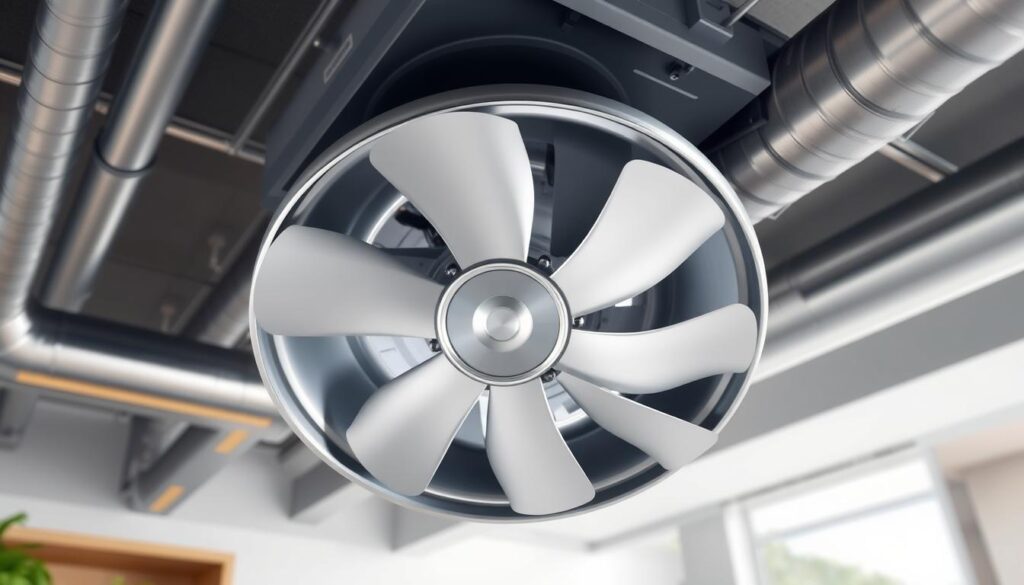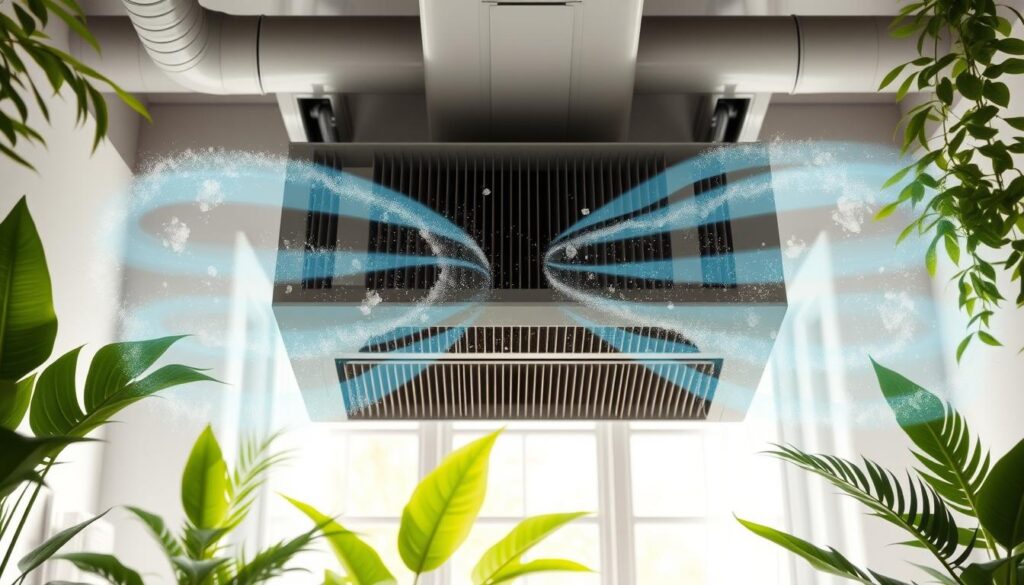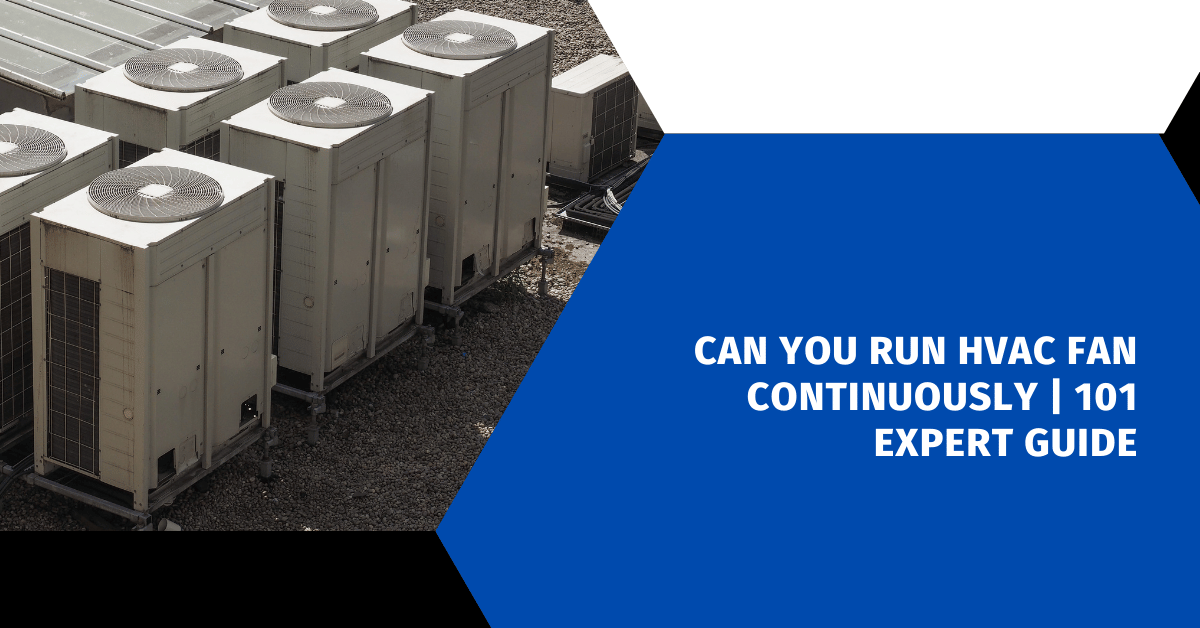Affiliate Disclosure
HVAC Guide Guys is a participant in the Amazon Services LLC Associates Program, an affiliate advertising program designed to provide a means for sites to earn advertising fees by advertising and linking to Amazon.
Can You Run HVAC Fan Continuously? Are you thinking about running your HVAC fan all the time or switching it to “AUTO” mode? Many homeowners are unsure about the best choice for energy savings and comfort. In this guide, we’ll look at the good and bad of running your HVAC fan 24/7. We’ll give you expert advice to help you decide what’s best for your home.

Key Takeaways
- Running your HVAC fan all day can really increase your energy bills. It can cost you hundreds of dollars every year.
- Keeping the fan on all the time in hot or cold weather can make your heating and cooling less efficient. This might raise your energy use.
- Setting the fan to “AUTO” mode is usually cheaper. It only runs when needed to keep your home at the right temperature.
- Running the fan all the time might make your air feel better and more circulated. But it can also cause uneven temperatures and wear out your system faster.
- The right fan mode depends on your home’s layout, how old your HVAC system is, and your local weather.
Table of Contents
Understanding HVAC Fan Operations
Your HVAC system’s fan is key to moving air around your home. Knowing how it works and its settings is important. It helps your system run better and save energy.
Basic Fan Functions and Settings
HVAC fans usually have two main settings: AUTO and ON. The AUTO mode turns the fan on when the system is working. The ON setting keeps the fan running all the time, even when the system is off.
The AUTO mode saves energy because the fan doesn’t run all the time. But, the ON mode can make air move better. This can help your home feel more even and the air cleaner.
Fan Operation Modes: AUTO vs ON
Deciding between AUTO and ON for your fan depends on what you need. The AUTO mode saves energy by only running when needed. But, the ON mode can keep air moving well, which is good for some homes.
Experts say running the fan all the time is best, especially in humid places. This helps keep the air in your home just right. Using a variable-speed blower can also help control humidity levels.
Think about your home’s layout, your HVAC system’s age and efficiency, and your local climate when choosing a fan mode. Knowing the benefits of each setting helps you choose the best one for your HVAC system.
Explore Our HVAC Shop
Looking for top-rated HVAC tools, parts, and accessories? Visit our shop and find the perfect solution for your needs.
Visit the ShopBenefits of Running Your HVAC Fan Continuously
Running your HVAC fan all the time can make your home better in many ways. One big plus is improved temperature distribution. The fan keeps air moving, making sure every room is at a comfortable temperature. This stops hot and cold spots that happen when the fan isn’t on.
Also, better indoor air quality is a benefit. The fan helps air move around, which cuts down on dust and moisture. This can stop mold and bad smells. Using good air filters also helps clean the air more.
- Running the fan all the time can make your HVAC system last longer by reducing wear and tear.
- New, energy-saving HVAC motors made for constant use can lower your monthly energy bills.
- For people with allergies, running the fan all the time can make the air cleaner and easier to breathe.
But, there are downsides to think about too. Running the fan all the time uses more energy and means you’ll need to change filters more often. Talking to an HVAC expert can help figure out the best way to use your fan.
| Benefit | Explanation |
|---|---|
| Temperature Distribution | Continuous fan operation helps circulate air evenly, reducing hot and cold spots. |
| Indoor Air Quality | The fan promotes air circulation, which can reduce dust, moisture, and odors. |
| HVAC Lifespan | Continuous operation may extend the lifespan of HVAC components. |
| Energy Efficiency | New, energy-efficient HVAC motors can reduce energy costs with continuous use. |
| Allergy Relief | Improved air filtration and circulation can benefit allergy sufferers. |
Running your HVAC fan all the time has its good points. But, it’s important to think about your home and climate, and your system’s age and efficiency. This will help decide the best choice for you.
Key Considerations for Fan Operation
Deciding whether to run your HVAC fan all the time involves several important factors. These include your home’s design, the age and efficiency of your HVAC system, and the local climate.
Home Layout and Design Factors
Your home’s design and layout play a big role. Newer homes with good air flow might not see much benefit from running the fan all the time. But older homes or those with bad air flow could really benefit from it.
System Age and Efficiency
The age and efficiency of your HVAC system are also key. New, efficient systems might not need the fan on all the time. But older systems could work better and cleaner with it running continuously. Still, think about the extra wear on the fan motor.
Climate and Weather Impact
The weather in your area affects how well running the fan all the time works. In places with extreme weather, like Calgary’s cold winters, it might not save much energy. But in areas with a lot of wildfire smoke, like Calgary, running the fan all the time can help clean the air better.
So, whether to run your HVAC fan all the time depends on weighing these factors. It’s about finding the right balance for your home and local weather.
Explore Our HVAC Shop
Looking for top-rated HVAC tools, parts, and accessories? Visit our shop and find the perfect solution for your needs.
Visit the ShopCan You Run HVAC Fan Continuously Without Issues?
Running your HVAC fan all the time can work, but think about the downsides and upkeep it needs. New, energy-saving systems might handle it well, but older ones might get worn out faster.
One important thing to think about is how long your HVAC system longevity will last. Keeping the fan on all the time can make your system last longer. This is because it keeps air moving and filters it well. Getting your HVAC checked every year is key to keeping it running smoothly.
The condition of your ductwork is also very important. If your ducts are sealed and insulated right, your system will work better. You might need a pro to check and fix your ducts for the best results.
Also, how old and efficient your HVAC system is matters a lot. New, energy-saving units can handle running the fan all day without problems. Getting a variable-speed air conditioner can also help save energy and keep your home comfy.
Finally, think about your climate and weather conditions. In places with mild weather and low humidity, running the fan all the time might be okay. But in hotter, more humid areas, it could use more energy and raise your bills.
“Running the HVAC fan continuously can help extend the lifespan of your system, as it ensures consistent air circulation and filtration.”
Knowing about system maintenance, energy use, and your local weather can help you decide if running the fan all the time is right for you. Talking to a pro HVAC tech can give you advice that fits your home’s needs.
Explore Our HVAC Shop
Looking for top-rated HVAC tools, parts, and accessories? Visit our shop and find the perfect solution for your needs.
Visit the ShopEnergy Consumption and Cost Analysis
Running your HVAC fan all the time affects energy use and costs. The fan’s energy needs can raise your monthly bills. It’s important to know how this works.
Monthly Operating Costs
A 500-watt fan in an HVAC system can use as much energy as a fridge in a year. This can add $50 or more to your electricity bills each month. The exact cost depends on your HVAC’s efficiency, local rates, and how much you use it.
Energy Efficiency Considerations
Newer, energy-saving HVAC systems might help with the fan’s energy use. They aim to improve airflow and cut energy use. This could lower your monthly bills. Finding the right balance between comfort, air quality, and cost is key.
| Factor | Impact on Energy Consumption |
|---|---|
| Dirty air filters | Decreased efficiency and increased power consumption |
| Reduced airflow | Motor works harder, leading to higher energy usage |
| Coil accumulation | Longer system run times to maintain temperature, resulting in increased energy consumption |
| Adjustable fan speed | Varied energy usage patterns based on system requirements |
Knowing how energy use works and following maintenance tips can help. This way, you can make your system more efficient and lower your energy costs.
Impact on Indoor Air Quality
Running your HVAC fan all the time can really help your indoor air quality. It makes sure air keeps moving through the air filtration. This can cut down on allergens and indoor air pollutants. It’s great for people with allergies or homes that don’t get much fresh air.
But, if your ducts leak or your system isn’t well-kept, running the fan all the time might spread dust. This could make air quality worse. It’s key to keep your HVAC in good shape and change the air filters often to get the most out of running the fan.
| Benefit | Potential Drawback |
|---|---|
| Improved air filtration and allergen reduction | Potential distribution of dust and contaminants with poorly maintained systems |
| Consistent air circulation, especially in homes with poor ventilation | Increased energy consumption and costs if the fan is not energy-efficient |
| Reduction of household odors through continuous air movement | Increased wear and tear on the HVAC system components |
To keep your air quality up while running the fan all the time, take good care of your system. Change the air filters often. Think about getting a more energy-saving fan. Talking to a local HVAC expert can help you find the best solution for your home.

“Running the HVAC fan continuously can help reduce the allergens in your home’s air, contributing to reduced allergies, especially during peak pollen seasons.”
Explore Our HVAC Shop
Looking for top-rated HVAC tools, parts, and accessories? Visit our shop and find the perfect solution for your needs.
Visit the ShopPotential Drawbacks of Continuous Fan Operation
Running your HVAC fan all the time has its upsides, but there are downsides too. You might need to do more HVAC maintenance and worry about wear and tear on your system.
Maintenance Requirements
With the fan always on, your HVAC’s air filters get dirty faster. This means you’ll need to change them more often. Keeping your filters clean is key to good airflow and system efficiency.
System Wear and Tear
Older or less efficient HVAC systems might not handle constant fan use well. It can stress out parts and shorten the system’s life. Keeping up with maintenance and watching how your system performs is important.
| Metric | Auto Setting | Continuous Fan |
|---|---|---|
| Frequency of Start-Stop Cycles | Higher | Lower |
| Energy Usage | Lower | Higher |
| Filter Replacement Rate | Lower | Higher |
| Impact on System Longevity | Increased wear and tear from frequent cycling | Reduced wear and tear from continuous operation |
Knowing these potential issues and taking care of your HVAC system can help. This way, running the fan continuously won’t hurt your system’s long-term health.
Best Practices for Fan Operation in Different Seasons
As the seasons change, your HVAC fan operation strategies should adapt to ensure optimal comfort and efficiency. During the summer cooling months, running your fan continuously can help distribute the cool air evenly throughout your home. However, in some climates, this may also increase indoor humidity levels, potentially leading to discomfort or even mold growth. The recommended indoor Relative Humidity levels in Tennessee typically range between 40% and 60%.
In the winter heating season, constant fan operation can help circulate warm air more effectively, but it may also blow cold air when the heating system is not actively running. To strike the right balance, consider using the “auto” mode, which ensures the fan only operates when the heating or cooling system is actively working. This not only saves energy but also reduces wear and tear on the fan motor, potentially extending its lifespan.
- Use the “auto” mode for regular fan operation to balance comfort and energy efficiency.
- Run the fan continuously during the summer to ensure even cooling, but monitor indoor humidity levels to avoid excess moisture.
- In the winter, the “auto” mode can help distribute heating more evenly without unnecessarily circulating cold air.
- Replace air filters every 1-3 months to maintain good airflow and reduce strain on the fan.
By adjusting your fan settings based on seasonal needs and local climate conditions, you can optimize your home’s comfort and energy efficiency throughout the year. If you’re unsure about the best fan operation practices for your home, consult with a local HVAC expert like Parthenon for personalized guidance.

Explore Our HVAC Shop
Looking for top-rated HVAC tools, parts, and accessories? Visit our shop and find the perfect solution for your needs.
Visit the ShopOptimizing Fan Performance for Maximum Efficiency
To get the most out of your HVAC system, managing fan operation is key. Think about using variable speed fans or programmable thermostats. These tools let you set fan schedules that fit your lifestyle.
Modern HVAC systems have a “circulate” feature. It makes the fan run for a bit each hour. This keeps air moving and temperatures even in your home. Don’t forget to keep up with maintenance like duct sealing and filter changes. It’s vital for your fan’s performance and energy use.
- Utilize variable speed fans or programmable thermostats to customize fan operation
- Leverage “circulate” features that run the fan for a set time each hour
- Prioritize regular maintenance, such as duct sealing and filter replacement
Finding the right balance between fan use and your home’s needs is important. It helps your HVAC system work better and use less energy. By adjusting fan settings and keeping up with maintenance, you’ll enjoy better comfort and air quality. Plus, you might save on energy bills.
“Regular maintenance and thoughtful fan management are key to unlocking the full potential of your HVAC system’s efficiency.”
The perfect fan speed settings depend on your home and HVAC system. Things like your home’s layout, climate, and system age matter. Talking to an HVAC expert can guide you to the best settings for your home. They’ll make sure your system runs at its best.
Conclusion
Deciding if your HVAC fan should run all the time is a big choice. You need to think about your home’s layout, how efficient your system is, the local weather, and what you like. Running the fan all the time can make your air cleaner and your home temperature even. But, it might use more energy and need more upkeep.
When you’re deciding on HVAC fan operation decision, finding the right balance is key. You want your home to be comfortable and your system to work well. Talk to HVAC experts to figure out the best plan for your home. They can help you save energy, keep the air clean, and think about future maintenance.
In the end, whether to run your HVAC fan all the time or not is up to you. It depends on what you need and want for your home. Knowing the good and bad points helps you choose what’s best for your home and your comfort.

